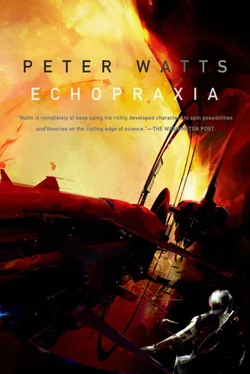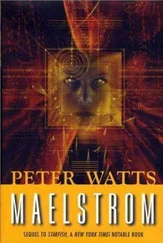He pushed them onto his forehead. The world reverted to a dim wash of blues and grays. The rough stone to his left broke the feeble ambient light into jagged fragments; to his right the wall was smooth gray metal.
Lianna was already past him, heading back up the stairs. “I gotta go. You can watch from down here.”
“But—”
“Don’t touch anything!” she called back, and was gone.
He stepped around the corner. The ceiling panels here were as dead and dark as every other he’d seen in this place. The room—really, more of a cul-de-sac—was lit solely by a band of smart paint covering the far wall from waist-height to ceiling. It glowed with a haphazard collage of tactical displays ranging from hand-size to two meters across. Some of the feeds were coarse green mosaics; others rendered images hi-res and razor-sharp.
A man in a loose tan coverall paced back and forth before the displays, at least two meters from his fuzzy slippers ( slippers? ) to the cropped salt-and-pepper thicket on his head. He spared a glance as Brüks approached, muttered “Glas- not, ” and turned back to the welter of intel.
Great .
Lianna the koala had told him he could watch, though. He stepped forward and tried to make sense of the chaos.
Upper-left: a satellite view so crisp it nearly hurt his eyes. The monastery sat dead center, a bull’s-eye on the board, aglow with telltale thermal emissions. But it was the only hot spot in the whole window; whatever orbital eye he was looking through had been precisely blinded to all those other heatprints closing in the darkness. Brüks reached for the display, his fingers set to zoom the mag; a grunt and a glare from the slippered monk and he desisted.
So much for orbital surveillance. The monastery had its own cameras though, judging by the mix of StarlAmp and thermal windows looking out across the desert. They painted the nightscape in palettes from every band of the visible spectrum, cool blues and rubies intense as lasers, color schemes so chaotic Brüks wondered whether they were really functional or just a reflection of some deviant bicameral aesthetic. Candles glowed in each of those windows, and they all looked the same.
Four klicks out, and closing fast.
Something sparkled on one of the displays, a tiny bright sundog in the dead of night. The image flared a moment; bright electronic snow fuzzed the display. A brief, bright nova. Then a dark dead hole in the wall, NO SIGNAL flashing from its center.
The monk’s fingers flew across the paint, calling up keyboards, zooming displays. Windows sprouted, panned brief landscapes, evaporated in turn. Three of those views sparked and died before the Bicameral had the chance to retire them gracefully.
They’re taking out our cameras, Brüks realized, and wondered distantly when he had started to think of these rapture-stricken deviants as part of we .
Less than three and a half kilometers, now.
A new set of windows bloomed across the wall. The pictures flickering in these frames were grainier than the others, desaturated, almost monochrome. And while they too panned the desert, there was something about those views, something different yet familiar—
There. Third window over: a tiny monastery hunkered on the horizon, a tiny vortex engine. This camera was looking back from way the hell across the desert.
That’s my network, Brüks realized. My cameras. I guess the zombies left some alive after all…
Brother Slippers had tapped into a half dozen of them, zoomed and cycled through each in turn. Brüks wasn’t sure how useful they’d be: cheap off-the-shelf things, party favors to lure impoverished researchers into springing for a package deal. They had the usual enhancements but the range was nothing special.
They seemed to be sufficient for Slippers’s purposes, though. Second window from the left, a heat source moved left to right about a hundred meters out. The camera panned automatically, tracking the target while he amped the zoom. The image resolved in slow degrees.
Another one of the monastery’s eyes flared and died, its overlaid range finder fading a moment later: 3.2 kilometers.
That’s almost nine meters per second. On foot …
“What happens when they get here?” he asked.
Slippers seemed more interested in a distant heatprint caught on number three: a small vehicle, an ATB, same basic design as—
Wait a minute—
“That’s my bike,” Brüks murmured, frowning. “That’s— me …”
Slippers spared him a glance and a head shake. “Assub.”
“No, listen —” It was far from a perfect mug shot, and Telonics’s steadicam tracking algorithms were the envy of no one in the field. But whoever sat astride that bike had Brüks’s mustache, the square lines of his face, the same multipocketed field vest that had been years out of style even when he’d inherited the damn thing two decades before. “You’re being hacked,” Brüks insisted. “That’s some kind of recording, someone must’ve—” Someone was recording me? “I mean, look at it!”
Two more cameras down. Seven so far. Slippers wasn’t even bothering to clear the real estate by closing the channels. Something else had caught his eye. He tapped the edge of a window that looked onto a naked-eye view of the desert sky. The stars strewn across that display glittered like sugar on velvet. Brüks wanted to fall into that sky, get lost in the stark peaceful beauty of a night without tactical overlays or polarized enhancements.
But even here, the monk had found something to ruin the view: a brief flicker, a dim red nimbus framing an oval patch of starscape for the blink of an eye. The display clicked softly, an infinitesimal sharpening of focus — and in the next instant the stars returned, unsullied and pristine.
Except for a great hole in the night hanging over the western ridge, a vast dark oval where no stars shone.
Something was crawling toward them across the sky, eating the stars as it went. It was as cold as the stratosphere—at least, it didn’t show up on any of the adjacent thermal views. And it was huge ; it covered a good twenty degrees of arc even though it was still—
No range finder. No heatprint. If not for whatever microlensing magic Slippers had just performed, not even this eclipse of ancient starlight would have given it away.
I, Brüks realized, have definitely picked the wrong side .
Twenty-three hundred meters. In five minutes the zombies would be knocking at the door.
“Carousel,” Slippers murmured, and something in his voice made Brüks look twice.
The monk was smiling . But he wasn’t looking at the cloaked behemoth marching across Orion’s Belt. His eyes were on a ground’s-eye view of the vortex engine. There was no audio feed; the tornado whirled silently in the StarlAmped window, a shackled green monster tearing up airspace. Brüks could hear it anyway—roaring in his memory, bending the ducts and the blades of the substructure that birthed it, vibrating through the very bedrock. He could feel it in the soles of his feet. And now Brother Slippers brought up a whole new window, a panel not of camera views or tactical overlays but of engineering readouts, laminar feed and humidity injection rates, measures of torque and velocity and compressible flow arrayed along five hundred meters of altitude. Offset to one side a luminous wire-frame disc labeled VEC/PRIME sprouted a thousand icons around its perimeter; a hundred more described spokes and spirals toward its heart. Heating elements. Countercurrent exchangers. The devil’s own mixing board. Slippers nodded, as if to himself: “Watch.”
Читать дальше








